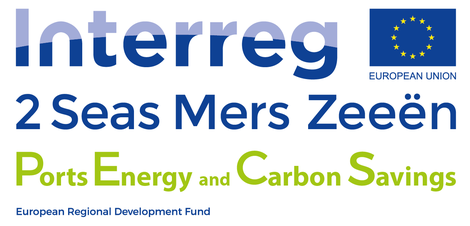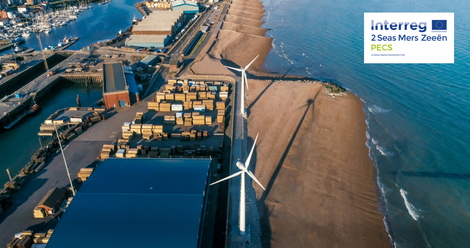Interreg 2 Zeeën - PECS
Interreg 2 Zeeën

PARTNERS: 10 partners:
> Autonoom Gemeentebedrijf Haven Oostende (BE),
> Gemeente Hellevoetsluis (NL)
> Omgevingsdienst IJmond (NL)
> HZ University of Applied Sciences (NL)
> CEREMA (FR),
> IndaChlor Sasu – Loon-Plage (FR)
> Southampton Solent University (UK)
> Portsmouth City Council (UK)
> Ghent University (BE)
> Blue Power Energy (Oostende, BE)
LEAD PARTNER: Autonoom Gemeentebedrijf Haven Oostende (BE) – Slijkensesteenweg 2 – 8400 Oostende – wim.stubbe@portofoostende.be – 0032 59 340 711
DURATION: 36 months
Description of the project (Dutch version)

This project is addressing this challenge; in particular the application of such technologies in maritime operations within small and medium sized (SMS-)ports. These ports face numerous common obstacles (such as limited resources, technical expertise, lack of collaboration, regulations) and as a result little has been done to reduce carbon emissions. Demonstrations of low carbon technologies and solutions in real life and different circumstances are required to raise awareness and to show feasibility. In addition to convince other SMS-ports it is also necessary to develop and showcase practical methods and tools as energy audit, potentials for renewables and the best mix of low carbon options. Finally SMS-ports needs practical models for low carbon investment & business cases and to come to energy cooperation structures.
Objectives
These are the objectives of PECS:
• Demonstrating and raising awareness among SMS-ports (authorities and users) of the possibilities of low-carbon technologies, including technical and economic feasibility
• Developing and showcasing practical methods, instruments, concepts and business models (consisting of a mix of applications) to provide SMS-ports with tools to achieve carbon reduction and carbon-neutrality in a period of 10-15 years.
• Developing new governance structures as well as low carbon energy management cooperative structures with the goal to jointly deploy and use low carbon applications, energy storage and distribution.
• Lobbying and creating support from local/regional authorities to simplify implementation of low-carbon technologies.
• Reaching a broad port-related audience in the 2 Seas area and bridging the gap between lack of time and taking time to learn from experiences in this PECS-project.
Role of Ghent University
Ghent University takes part in this project through the Power-Link department.
Power-Link UGent is an energy knowledge platform with research infrastructure for energy production and distribution. In the PECS project, Power-Link will contribute to realize the objectives by using its expertise and knowledge with regard to energy efficiency, transition to low carbon economy and technologies, wind turbines, blue energy, energy management systems etc.
In the PECS project, Power-Link UGent is responsible for developing a decision making tool which will help the ports (including those outside PECS) to select their best mix of low carbon technologies. The developed tool will help to define the best option based on economical and/or environmental aspects. As a knowledge partner, Power-Link UGent will provide support to the pilot partners in the installation of the monitoring systems and testing equipment, that will be used to monitor the implemented low carbon technologies. Based on the data obtained from conducted pilot partners, the performance of the developed tool will be evaluated and validated.
Furthermore, as Work Package leader of the Communication Work Package, Power-link will use its broad quadruple helix network, interlinking the business & research community, policy makers & end users to ensure dissemination, communication and outreach of the project results.
Contact
Prof. Lieven Vandevelde
Department Power-Link UGent
Phone number: +32 59 242 740 en +32 473 82 37 12
E-mail: Lieven.Vandevelde@UGent.be
French summary
L’introduction de technologies sobres en carbone (y compris l’énergie renouvelable et l’efficacité énergétique) est un des principales objectifs du Programme Interreg des 2 Mers.
Le présent projet PECS veut réaliser la transition vers une économie portuaire à faible intensité de carbone y se concentre plus particulièrement sur l’introduction et l’application de technologies sobre en carbone dans l’environnement maritime des ports de taille petite et moyenne. Le manque de capacité économique, les lacunes en expertise technique et la réglementation complexe sont quelques exemples des obstacles qui expliquent la faible implémentation des technologies sobre en carbone. Le projet PECS veut donc sensibiliser les gestionnaires des ports de taille petite et moyenne et démontrer la faisabilité et viabilité des technologies sobre en carbone en utilisant des sites pilotes et en élaborant des solutions pratiques, tout en tenant compte des circonstances réelles et particulières des ports. En plus, afin de répandre les résultats et de convaincre des autres ports, il est indispensable de développer des méthodes et instruments pratiques et génériques, comme un audit de l’efficacité énergétique, l’étude du potentiel de l’énergie renouvelable et un outil qui sert à déterminer le mix optimale des ressources sobre en carbone. En outre, les ports de taille petite et moyenne ont besoin de modèles pratiques qui les permettent de budgéter les investissements et les projets pilote. Ces ports ont également besoin d’outils pour établir des réseaux de coopération d’approvisionnement énergétique.